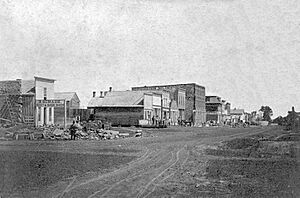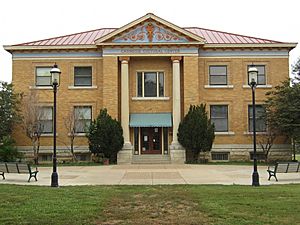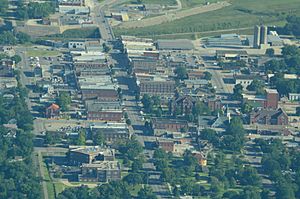Ottawa, Kansas facts for kids
Quick facts for kids
Ottawa, Kansas
|
|
|---|---|
|
City and County seat
|
|
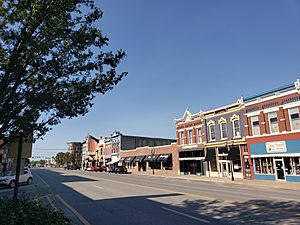
Ottawa Historic District (2018)
|
|
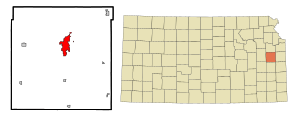
Location within Franklin County and Kansas
|
|
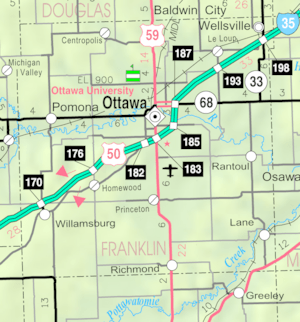
|
|
| Country | United States |
| State | Kansas |
| County | Franklin |
| Founded | 1865 |
| Incorporated | 1866 |
| Named for | Ottawa Tribe |
| Government | |
| • Type | Council-Manager |
| Area | |
| • Total | 10.40 sq mi (26.94 km2) |
| • Land | 10.31 sq mi (26.72 km2) |
| • Water | 0.09 sq mi (0.23 km2) 1.06% |
| Elevation | 925 ft (282 m) |
| Population
(2020)
|
|
| • Total | 12,625 |
| • Density | 1,213.9/sq mi (468.63/km2) |
| Time zone | UTC-6 (CST) |
| • Summer (DST) | UTC-5 (CDT) |
| ZIP code |
66067
|
| Area code | 785 |
| FIPS code | 20-53550 |
| GNIS ID | 485638 |
Ottawa (pronounced /ˈɒtəwɑː/) is a city in Franklin County, Kansas, United States. It is also the county seat, which means it's where the main government offices for the county are located. The city sits on both sides of the Marais des Cygnes River. In 2020, about 12,625 people lived there. Ottawa is also home to Ottawa University.
Contents
History of Ottawa
How Ottawa Got Its Name
The city of Ottawa gets its name from the Ottawa Native American tribe. The city was built on land that used to be their reservation. In 1864, the tribe made an agreement, called a treaty, to give 20,000 acres of land. This land was used to start and pay for Ottawa University, a school for both Native American and non-Native American students. The word "Ottawa" itself means "to trade." In 1867, the Ottawa tribe sold their remaining land in Kansas and moved to what is now Oklahoma.
The first non-Native American settlement in the new town was built on March 31, 1864, by J.C. Richmond. It was located at the corner of Walnut and First streets.
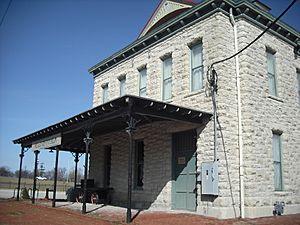
Ottawa's Flooding History
Ottawa is located right on the Marais des Cygnes River, which means it has experienced floods over the years. The first big flood recorded in the area was the Great Flood of 1844.
Some other major floods happened in:
- 1904: Water was shoulder-deep in the Santa Fe depot.
- 1928: The water reached 38.65 feet high and sadly, six people lost their lives.
- 1951: This was the most famous flood, known as the Great Flood of 1951. It was even higher than the 1928 flood. This flood affected many parts of Missouri and Kansas, and one-third of Ottawa was covered in water.
Today, it's much less likely that Ottawa will have major flood damage. This is because the U.S. Army Corps of Engineers built a series of levees (protective walls) and pumping stations in the 1960s. These structures help control the Marais des Cygnes River and protect the city. The levees are checked every year to make sure they are in good condition.
Ottawa During World War II
In 1943, during World War II, German and Italian prisoners of war were brought to Kansas and other Midwest states. They helped with labor shortages because many American men were away serving in the war. Large camps were set up in Kansas, and Fort Riley had smaller branch camps, including one in Ottawa.
Geography and Climate
Where is Ottawa Located?
Ottawa is about 58 miles (93 km) southwest of Kansas City. It's where two main roads, U.S. Route 59 and K-68, meet. U.S. Route 50 and Interstate 35 go around Ottawa to the south and east, but a business route of US-50 goes right through the city.
The city covers about 9.42 square miles (24.40 km2). Most of this area is land, with a small part being water.
Ottawa's Climate
Ottawa has a climate where temperatures can vary quite a bit.
- Hot days: The temperature reaches 90°F (32°C) or higher about 46 days a year. It can even reach 100°F (38°C) or higher about 5 days a year.
- Cold days: The temperature drops below freezing (32°F or 0°C) about 111 days a year.
| Climate data for Ottawa, Kansas (1991–2020 normals, extremes 1895–present) | |||||||||||||
|---|---|---|---|---|---|---|---|---|---|---|---|---|---|
| Month | Jan | Feb | Mar | Apr | May | Jun | Jul | Aug | Sep | Oct | Nov | Dec | Year |
| Record high °F (°C) | 76 (24) |
84 (29) |
93 (34) |
96 (36) |
101 (38) |
108 (42) |
118 (48) |
113 (45) |
111 (44) |
98 (37) |
86 (30) |
75 (24) |
118 (48) |
| Mean maximum °F (°C) | 64.2 (17.9) |
69.9 (21.1) |
78.2 (25.7) |
84.2 (29.0) |
89.5 (31.9) |
93.9 (34.4) |
99.1 (37.3) |
99.0 (37.2) |
93.9 (34.4) |
86.3 (30.2) |
74.2 (23.4) |
65.3 (18.5) |
100.7 (38.2) |
| Mean daily maximum °F (°C) | 39.9 (4.4) |
45.5 (7.5) |
56.0 (13.3) |
65.9 (18.8) |
75.2 (24.0) |
84.4 (29.1) |
89.3 (31.8) |
88.2 (31.2) |
80.3 (26.8) |
68.7 (20.4) |
54.8 (12.7) |
43.4 (6.3) |
66.0 (18.9) |
| Daily mean °F (°C) | 29.0 (−1.7) |
33.8 (1.0) |
43.7 (6.5) |
53.7 (12.1) |
64.3 (17.9) |
73.8 (23.2) |
78.4 (25.8) |
76.6 (24.8) |
68.2 (20.1) |
56.3 (13.5) |
43.2 (6.2) |
32.9 (0.5) |
54.5 (12.5) |
| Mean daily minimum °F (°C) | 18.2 (−7.7) |
22.0 (−5.6) |
31.5 (−0.3) |
41.6 (5.3) |
53.3 (11.8) |
63.2 (17.3) |
67.6 (19.8) |
65.0 (18.3) |
56.0 (13.3) |
43.8 (6.6) |
31.7 (−0.2) |
22.4 (−5.3) |
43.0 (6.1) |
| Mean minimum °F (°C) | −0.2 (−17.9) |
5.9 (−14.5) |
15.4 (−9.2) |
27.8 (−2.3) |
38.5 (3.6) |
51.9 (11.1) |
58.2 (14.6) |
55.3 (12.9) |
41.0 (5.0) |
28.2 (−2.1) |
17.6 (−8.0) |
6.1 (−14.4) |
−4.3 (−20.2) |
| Record low °F (°C) | −20 (−29) |
−28 (−33) |
−9 (−23) |
11 (−12) |
21 (−6) |
40 (4) |
47 (8) |
42 (6) |
27 (−3) |
16 (−9) |
1 (−17) |
−22 (−30) |
−28 (−33) |
| Average precipitation inches (mm) | 1.22 (31) |
1.57 (40) |
2.29 (58) |
3.79 (96) |
5.82 (148) |
5.55 (141) |
3.75 (95) |
4.63 (118) |
4.05 (103) |
3.08 (78) |
2.39 (61) |
1.71 (43) |
39.85 (1,012) |
| Average snowfall inches (cm) | 3.2 (8.1) |
2.1 (5.3) |
0.7 (1.8) |
0.0 (0.0) |
0.0 (0.0) |
0.0 (0.0) |
0.0 (0.0) |
0.0 (0.0) |
0.0 (0.0) |
0.1 (0.25) |
0.5 (1.3) |
2.6 (6.6) |
9.2 (23) |
| Average precipitation days (≥ 0.01 in) | 6.5 | 6.4 | 8.1 | 10.2 | 12.6 | 10.3 | 8.8 | 9.3 | 8.2 | 8.7 | 6.5 | 6.2 | 101.8 |
| Average snowy days (≥ 0.1 in) | 2.8 | 1.7 | 0.6 | 0.0 | 0.0 | 0.0 | 0.0 | 0.0 | 0.0 | 0.1 | 0.5 | 1.9 | 7.6 |
| Source: NOAA | |||||||||||||
Population of Ottawa
| Historical population | |||
|---|---|---|---|
| Census | Pop. | %± | |
| 1870 | 2,941 | — | |
| 1880 | 4,032 | 37.1% | |
| 1890 | 6,248 | 55.0% | |
| 1900 | 6,934 | 11.0% | |
| 1910 | 7,650 | 10.3% | |
| 1920 | 9,018 | 17.9% | |
| 1930 | 9,563 | 6.0% | |
| 1940 | 10,193 | 6.6% | |
| 1950 | 10,081 | −1.1% | |
| 1960 | 10,673 | 5.9% | |
| 1970 | 11,036 | 3.4% | |
| 1980 | 11,016 | −0.2% | |
| 1990 | 10,667 | −3.2% | |
| 2000 | 11,921 | 11.8% | |
| 2010 | 12,649 | 6.1% | |
| 2020 | 12,625 | −0.2% | |
| U.S. Decennial Census 2010-2020 |
|||
As of the 2020 census, Ottawa had a population of 12,625 people. The city had 5,095 households and 3,095 families. The average age of people in Ottawa was about 36 years old. About 23.5% of the population was under 18 years old.
Economy and Jobs
Ottawa has two main employers: Walmart and American Eagle Outfitters. Both companies have large distribution centers in the city, which are places where goods are stored and sent out to stores.
The city also has freight train service from BNSF railway, which helps move goods in and out of Ottawa. There's also a grain elevator run by the Ottawa Co-Op, used for storing grain from farms.
For air travel, the city operates the Ottawa Municipal Airport. It's a small airport used for private and small aircraft.
Education in Ottawa
Colleges and Universities
Ottawa is home to Ottawa University, a private four-year university. There is also a branch campus of Neosho County Community College in the city.
Schools for Kids
The public schools in Ottawa are part of the Ottawa USD 290 school district. There are five schools in the district:
- Ottawa High School
- Ottawa Middle School
- Garfield Elementary School
- Lincoln Elementary School
- Sunflower Elementary School
Ottawa also has several private schools:
- Sacred Heart Catholic Elementary School
- Pilgrim Bible Academy
- Ottawa Christian Academy
Media and Entertainment
Local News
The main newspaper for Ottawa is the Ottawa Herald, which started in 1869. It's owned by a company called GateHouse Media. There's also a monthly publication for seniors called Kaw Valley Senior Monthly.
Radio Stations
Ottawa has four radio stations:
- KOFO (1220 AM): This station plays country music and focuses on local news for East-Central Kansas.
- KCHZ (95.7 FM): Licensed to Ottawa, its studios are in Mission, Kansas.
- KTJO-FM (88.9 FM): This is the student radio station for Ottawa University.
- KRBW (90.5 FM): This station broadcasts Christian programming from Ottawa.
Oldest Cinema
Downtown Ottawa is home to the Plaza Grill and Cinema. This movie theater, which used to be called the Crystal Plaza and Bijou Theater, was discovered in 2013 to be the oldest continuously operating cinema in America! There are plans to create an exhibit about its history.
Notable People from Ottawa
Many interesting people have come from Ottawa, Kansas:
- Steve Grogan: A former quarterback for the New England Patriots. He led Ottawa High School to success in both football and basketball.
- Don Harrison: A news anchor who was one of the first anchors for CNN Headline News.
- Gary Hart: A former U.S. Senator from Colorado and a presidential candidate in the 1980s.
- Steven Hawley: An American astronaut.
- Isaac Smith Kalloch: One of the people who signed Ottawa's original town company charter. He later became the Mayor of San Francisco.
- Semi Ojeleye: A professional basketball player who played for the Milwaukee Bucks. He helped Ottawa High School win a state basketball championship.
- Stanley Sheldon: A bassist and vocalist famous for his work with Peter Frampton, especially on the Frampton Comes Alive! album.
- John G. Thompson: A very important mathematician.
- Jerry Voorhis: A U.S. Representative for California from 1937 to 1947.
See also
 In Spanish: Ottawa (Kansas) para niños
In Spanish: Ottawa (Kansas) para niños
 | Selma Burke |
 | Pauline Powell Burns |
 | Frederick J. Brown |
 | Robert Blackburn |


